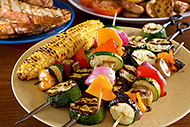
Measure your portions.
Understanding proper food portions allows you to develop a healthier relationship with food and decrease your calorie intake. For at least a few weeks, grab the measuring cups, spoons, and kitchen scale. Measure your food so that you know what a four ounce chicken breast, a half cup of rice, and eight ounces of milk look like. Over time you will be able to eyeball a healthy portion. This will help you better control the amount you eat when you are served too much food -- like when dining out.
Leave serving dishes in the kitchen.
Serve your meals buffet style in the kitchen. Fill your plate with healthy portions and take it to the dining room table. Save family-style meals where the serving dishes sit on the table for special occasions. It makes it much easier to mindlessly scoop out a second or third helping when the food is within reach.
Eat more often.
Research results are mixed as to whether it is more beneficial to eat three larger meals a day or to incorporate smaller meals with snacks. If you find you can’t control your appetite between meals, consider spreading your calorie intake more evenly throughout the day. This makes it easier to listen to hunger signals and have a snack when you are truly hungry without consuming too many calories that could prevent weight loss. Everyone is different. Experiment a little to find what combination of healthy meals and snacks work best to keep you satisfied.
Increase your protein intake.
Protein helps to stabilize your blood sugar and prevent spikes and crashes that drain your energy. If your diet is heavy in carbohydrates, like fruit or grains, try increasing your protein intake to better control hunger. Eat a few nuts with your fruit, or try beans with rice or quinoa.
Incorporate your favorite foods.
Deprivation always leads to more cravings. When you deny yourself your favorite foods, you risk overdoing it when you finally indulge. When you know a food is not off limits and that you can have a small amount whenever you truly want it, you will be less likely to become fixated and binge on those foods.
Clear off the countertops.
Simply keeping food out of sight can do wonders for controlling your appetite. Seal up those bags of pretzels and boxes of crackers and put them in the pantry. This will prevent you from wanting to grab a quick handful every time you walk into the kitchen.
Stay busy.
Sometimes simply staying busy is enough to keep your mind off unnecessary snacking. Make a running list of things you would like to accomplish or things that will distract you from food. When you find yourself tempted to snack during down time, pull out the list. Send the email you’ve been putting off, organize your pile of magazines, or do a quick set of ab exercises.
Eliminate distracted eating.
Eating when your focus is not on the activity at hand only leads to overeating. Turn off the television, close the laptop, and set down the smartphone. Eat mindfully, enjoy your food, and stop when you begin to feel full.
Set boundaries.
Developing healthy habits and eating to lose weight takes discipline and that means setting a few boundaries. This might be closing the kitchen after dinner, only eating pre-portioned healthy snacks, or having dessert only twice a week. Identify what makes you stray from your plan and develop some healthy rules that help you stay on track.



 3 Healthy Lunches for Your Work Week
3 Healthy Lunches for Your Work Week
 5 Tips for Stretching Your Budget for Healthy Food
5 Tips for Stretching Your Budget for Healthy Food
 Best Ways to Reduce Added Sugar
Best Ways to Reduce Added Sugar
 Healthy Tips to Lighten Up Picnic Foods
Healthy Tips to Lighten Up Picnic Foods
 Do You Need to Drink Milk?
Do You Need to Drink Milk?
 Tips to Keep Track of Water Intake
Tips to Keep Track of Water Intake
 What Is a Paleo Diet?
What Is a Paleo Diet?
 Eating to Build Muscle
Eating to Build Muscle

 Pinterest
Pinterest RSS Feed
RSS Feed